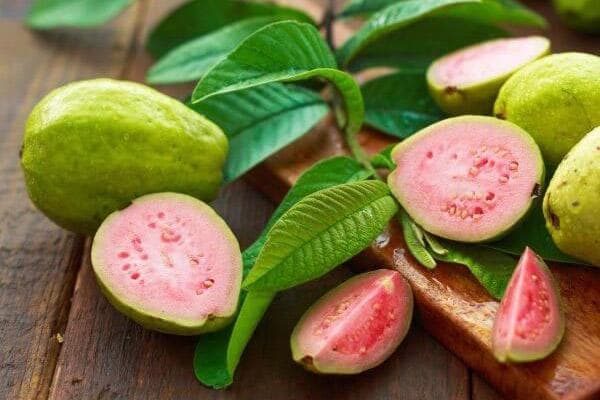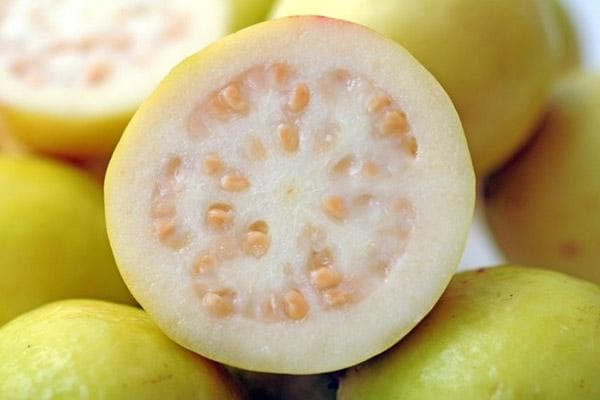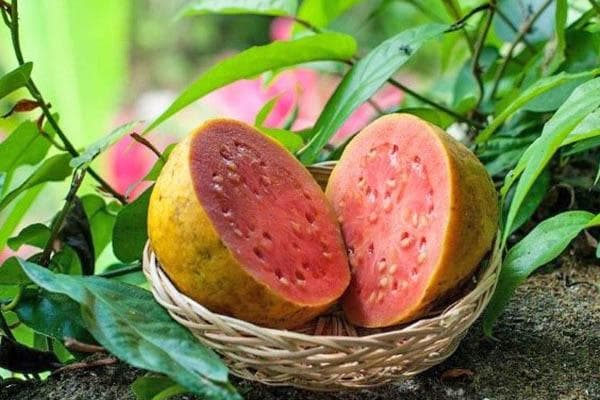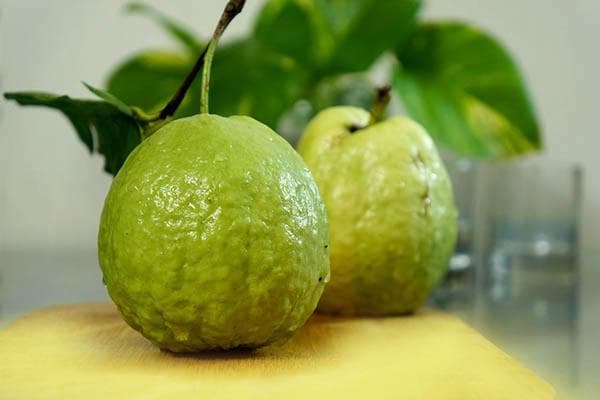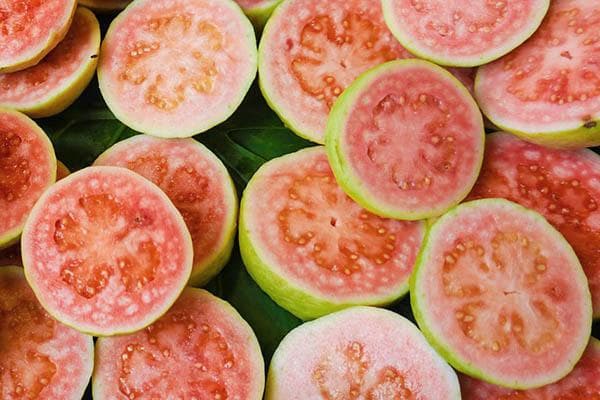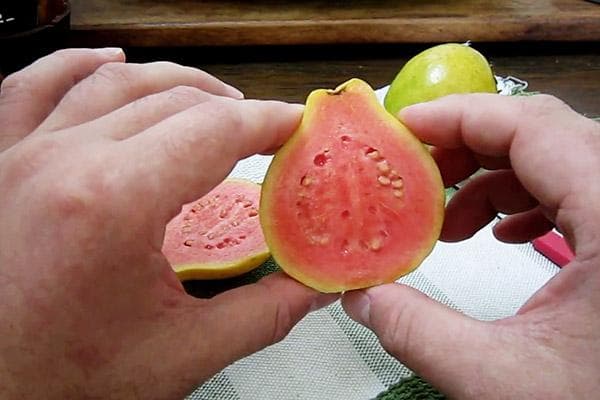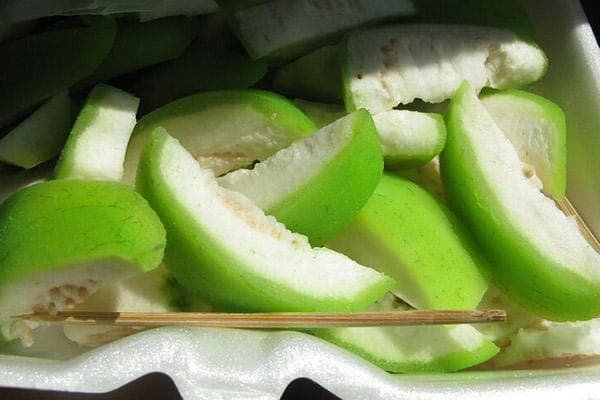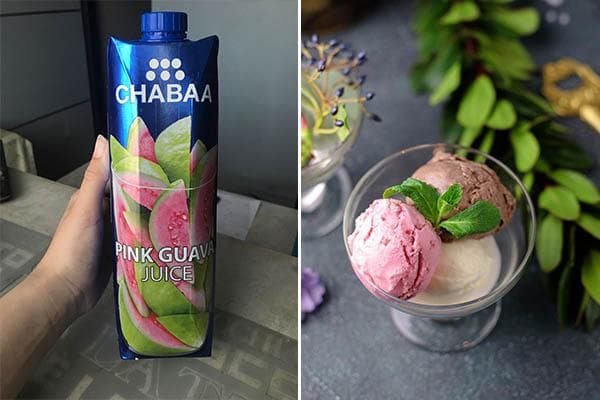What does the tropical fruit guava look like and what will it delight you with besides its taste?
Guava (fruit) is a fruit that grows on the woody shrub Psidium of the Myrtaceae family. As soon as it is not called in the world: guava, goyaba, juafa. Externally, the fruit resembles an apple or pear, but its taste is intertwined with a variety of tropical notes. When consumed regularly, guava provides health benefits and helps prevent the development of chronic diseases. We will tell you what properties Psidium fruits have and how to eat them correctly.
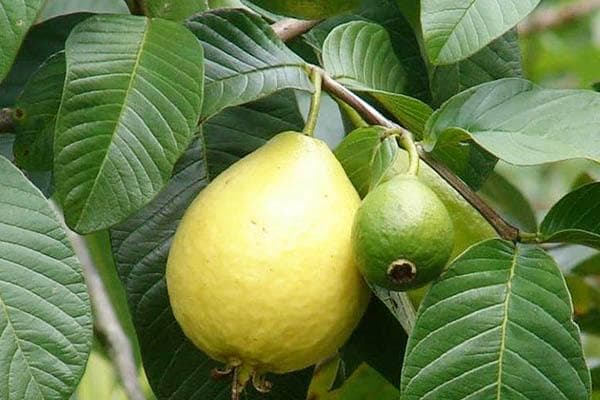
How and where does guava grow?
Psidium is considered to be native to South and Central America. Although now the shrub grows in many regions with tropical and subtropical climates. The plant is unpretentious and withstands drought well. During the year, guava produces one rich harvest (up to 100 kg of fruit), as well as 2–4 additional ones.
The main producers and suppliers of fruit to the world market include the following countries:
- Brazil;
- Colombia;
- Mexico;
- USA;
- Caribbean countries;
- Israel;
- Egypt;
- SOUTH AFRICA;
- India;
- Pakistan;
- Thailand.
Growing Psidium is as economically profitable as bananas. However, during long-term transportation, the delicate fruit is easily damaged and quickly deteriorates. This explains the high cost of guava on the market of Russia and other CIS countries.
What does guava look like and what does it taste like?
Guava fruits are round or pear-shaped and have a thin but bumpy skin. They have a strong musky odor.They reach 4-6.5 cm in length and 5-7 cm in diameter. One fruit weighs from 70 to 160 grams.
Guava skin can be green, light yellow, bright yellow or pinkish in color. The flesh of the fruit is pale yellow (almost white) or pink, depending on the variety. It is very juicy and literally melts in your mouth. There are edible seeds inside.
The taste of the fruit is more delicate than pronounced. It contains subtle sweet, sour and minty notes. Many people think that the taste of guava is similar to a mixture of quince, strawberry and pineapple.
Calorie content and chemical composition of guava
For its rich chemical composition and excellent dietary properties, guava was loved by the wives of oligarchs. The calorie content of 100 g of fruit is only 68–70 kcal.
The fruits have virtually no fat, but contain essential amino acids and carbohydrates. It is almost impossible to gain weight from eating guava because it contains a lot of dietary fiber. The latter remove excess fats and sugars, toxins, and heavy metal salts from the body.
Doctors and nutritionists recommend that people eat guava to replenish the lack of vitamins, macro- and microelements in the body. The table below shows what substances the tropical fruit is rich in.
Table 1. Chemical composition of guava
| Name of substance | Percentage of daily value in 100 g | Beneficial features |
|---|---|---|
| Vitamin C | 253% | Participates in the formation of immunity, protects the body from cancer and premature aging, increases vascular tone |
| Folic acid | 12% | Prevents anemia and fetal pathologies in pregnant women, normalizes the menstrual cycle |
| Vitamin B5 | 9% | Stimulates the production of adrenal hormones, reduces the level of “bad” cholesterol |
| Beta-carotene (provitamin A) | 7,5% | Improves vision, reproductive function, skin and hair condition |
| Potassium | 16% | Normalizes blood pressure and heart rate, relieves swelling |
| Copper | 23% | Promotes the conversion of iron into hemoglobin, stimulates collagen production |
Guava for health - beneficial properties
The high cost is compensated by the beneficial properties that the body receives when consuming the tropical fruit. Thus, even citrus fruits and black currants cannot compare with guava in terms of ascorbic acid content.
- Normalizes digestion
Since guava pulp is rich in dietary fiber, doctors recommend eating the fruit for people who suffer from constipation. At the same time, the seeds have the most pronounced laxative properties, so it is better not to throw them away, but to eat them.
With regular consumption of fruits, the acid-base balance in the body is normalized. Heartburn, heaviness in the stomach and bloating cease to bother you.
- Helps you lose weight
Guava is a low-calorie product with excellent fat-burning properties. It fills the body with substances that “accelerate” metabolism: vitamins C, A, B5, PP, potassium and copper. Enzymes that are present in the pulp convert food into energy, preventing it from being stored in fat reserves.
However, to lose weight, guava should only be eaten fresh. Jams, jams, syrups and other sweets with added fruit will only harm your figure.
- Reduces blood pressure
This effect is achieved due to the high content of potassium and vitamin C in the fruit. Guava removes excess fluid from the body, which leads to a decrease in the volume of circulating blood and a decrease in the load on the heart. Ascorbic acid improves blood circulation, makes blood vessels stronger and more elastic.
At the same time, in hypotensive patients, after eating the fruit, blood pressure remains normal.Guava eliminates muscle weakness and improves performance.
- Strengthens immunity
Ascorbic acid, vitamins A and B5, as well as flavonoids found in guava, participate in the formation of protective antibodies. At the same time, unripe fruits have the highest biological activity. If there are no problems with the gastrointestinal tract, “green” guava can also be eaten, although it is hard and sour in taste.
- Protects the body from cancer
Guava is a storehouse of antioxidants. These are substances that reduce oxidative stress in the body and protect healthy cells from free radical damage.
Ellagic acid has the highest antioxidant activity in guava. It fights carcinogens, reduces inflammation in the body, and slows down the growth of cancer cells. Ellagic acid is also an excellent antiseptic: it prevents the proliferation of viruses, bacteria and pathogenic fungi.
Vitamins A, C and flavonoids also provide antioxidant protection to the body. Therefore, just 1 fruit a day will be enough to dramatically reduce the risk of a dangerous disease.
Contraindications to guava consumption and potential harm
Guava is a rather rare fruit for residents of the CIS countries. When you first use it, you may experience food intolerance and the following symptoms: nausea, diarrhea, headache. Therefore, it is better to start with a small piece.
Tropical fruits have the following contraindications for consumption:
- Diabetes. Due to the high sugar content, guava can cause a sharp increase in blood glucose levels and lead to the development of complications.
- Diseases of the gastrointestinal tract and kidneys (gastritis, ulcer, pyelonephritis, urolithiasis). The fruit contains compounds that have an irritating effect on the mucous membranes.Unripe fruits are especially harmful to sick people.
Guava should not be overused, since just 100 g contains 2.5 times the daily requirement of vitamin C. With an excess of this substance, a person may experience nausea, vomiting, dizziness, rashes and itching on the skin.
How to eat guava: how to eat it correctly and how it is most often eaten?
Fresh guava provides the greatest health benefits. How to eat it correctly? Just wash the fruit under running water and let it dry. Slice like an apple. At the same time, do not remove the peel, since 2/3 of the beneficial substances are contained in it. Eat guava directly with the seeds. They are not as hard as an apple and are easily digested by the body.
Residents of the CIS countries most often eat guava as part of desserts and drinks. After all, fresh fruit is difficult to find on the shelves of regular stores, and it is expensive.
Guava adds a delicious taste to the following products:
- juices;
- syrups;
- jams;
- jam;
- marmalade;
- baking;
- ice cream;
- cottage cheese;
- fruit salads (fruits go especially well with passion fruit and tamarillo).
For medicinal purposes, drink a decoction from the leaves of the plant. This remedy helps with intestinal infections, painful menstruation, and upper respiratory tract diseases. For toothache or gum problems, you can chew fresh leaves.
The store also sells canned guava pieces. However, in this form, the fruit, although it has a pleasant taste, provides few health benefits.
Thus, guava is a very healthy curiosity from hot countries. It has a strong aroma, delicate taste and a lot of medicinal properties. Guava helps people gain beauty, slimness, good mood and slow down the onset of old age. Eat this tropical fruit to delight your body.
